|
|
|
Sort Order |
|
|
|
Items / Page
|
|
|
|
|
|
|
| Srl | Item |
| 1 |
ID:
106499
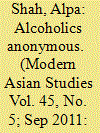

|
|
|
|
|
| Publication |
2011.
|
| Summary/Abstract |
From millenarian movements to the spread of Hindu rightwing militancy, attacks on adivasi (or tribal) consumption of alcohol have gone hand-in-hand with the project of 'civilizing the savage'. Emphasizing the agency and consciousness of adivasi political mobilization, subaltern studies scholarship has historically depicted adivasis as embracing and propelling these reformist measures, marking them as a challenge to the social structure. This paper examines these claims through an analysis of the relationship between alcohol and the spread of the Maoist insurgency in Jharkhand, Eastern India. Similar to other movements of adivasi political mobilization, an anti-drinking campaign is part of the Maoist spread in adivasi areas. This paper makes an argument for focusing on the internal diversity of adivasi political mobilization-in particular intergenerational and gender conflicts-emphasizing the differentiated social meanings of alcohol consumption (and thus of prohibition), as well as the very different attitudes taken by adivasis towards the Maoist campaign. The paper thus questions the binaries of 'sanskritisation' versus adivasis assertion that are prevalent in subaltern studies scholarship, proposing an engagement with adivasi internal politics that could reveal how adivasi political mobilization contains the penetrations of dominant sanskritic values, limitations to those penetrations and other aspirations, such as the desire for particular notions of modernity.
|
|
|
|
|
|
|
|
|
|
|
|
|
|
|
|
| 2 |
ID:
094617
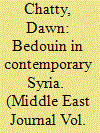

|
|
|
|
|
| Publication |
2010.
|
| Summary/Abstract |
Little information is available regarding contemporary relations between Bedouin tribes and the Syrian state apparatus. These ties are mainly expressed through relationships of patronage and clientism between tribal leaders and state operatives. The Bedouin tribes of Syria continue to function as groups tied in networks of real and fictive kinship; these bonds provide the tribal members with a solidarity and cohesiveness which the state has not been able to suppress despite decades of effort.
|
|
|
|
|
|
|
|
|
|
|
|
|
|
|
|
| 3 |
ID:
187283
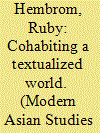

|
|
|
|
|
| Summary/Abstract |
Stories matter—writing them down matters. For indigenous (Adivasi) peoples from oral traditions, literature has become a way to maintain culture and keep it alive. This article too is a story—an investigative one—questioning and vocalizing the challenges we encounter in trying to articulate our realities and histories in a form that is new to us, one that we've been denied as a practice and one we are not believed we are entitled to use. Mainstream cultures have side-lined, overshadowed, and subjugated our knowledge systems, placing us in structures we have to traverse, and within which we have to exist, which is possible only by internalizing and mirroring others' or mainstream ways and languages to gain legitimacy as peoples or, worse, being branded and judged by their versions of narratives of us. This article plots the course of Adivasi histories and narratives enduring, outlasting, or being demolished by dislocation and dispossession, by dominant languages and cultures, and how both writing and orality are practices of both resistance and resurgence.
|
|
|
|
|
|
|
|
|
|
|
|
|
|
|
|
| 4 |
ID:
179106
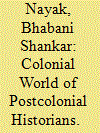

|
|
|
|
|
| Summary/Abstract |
This article develops a critical analysis of the colonial world of the postcolonial historians whose works inadvertently contribute to the process of reconstituting the colonial construction of tribal identities in neoliberal India. The monolithic and colonial construction of tribal identities in postcolonial India reinforces and preserves tribal identities along the lines of the colonial methods of identity formation based on territorialization. The article highlights the problematic features of the territorialization and deterritorialization of tribal identities and their reconstitution. Territorial-based identity formation is now being used and sustained by the neoliberal political and economic ruling and non-ruling elites in order to exploit tribal communities. The existence of upper-caste and class-based Hindu social order is concomitant with a social hierarchy based on the exploitation of tribal communities in India. This article locates the colonial and neoliberal capitalist logic of identity formation that serves elites, and helps to advance the neoliberal political-economic project of the Hindu right. A postmodern logic of identity formation facilitates the expansion of the neoliberal capitalist economy with the process of Hinduization. It contributes to identity formations that divide the people on territorial grounds. The article is divided into four parts. The first outlines the philosophical basis of identity formation and its links with neoliberalism; the second deals with identity formation based on territory; part three documents the debates on tribal identity formation in postcolonial India; and the final part elucidates the capitalist logic inherent in territorial-based identity formations.
|
|
|
|
|
|
|
|
|
|
|
|
|
|
|
|
| 5 |
ID:
104123
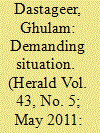

|
|
|
| 6 |
ID:
180253
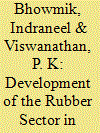

|
|
|
|
|
| Summary/Abstract |
The development of the rubber sector in North East (NE) India in recent decades is an outcome of the government’s import substitution initiatives in the post-independence period. The article attempts to trace the process of evolution and development of the rubber sector in the region and observes that the adopted policies for rubber expansion had been framed under the narrow innovation system model, whereby the localised knowledge and learning, as well as practices, remained completely ignored in the promotion of the sector. The lack of region-specific rubber development strategies with appropriate linkages supported by institutional systems are the critical gaps that undermine the sustainable growth of the rubber sector in the NE region. Eventualities of the sort call for reinventing policies and programmes under the broad innovation system framework, so as to reap the advantages emanating from the integration of the region with the global market and facilitate greater diversification and sustainable growth of the rubber sector.
|
|
|
|
|
|
|
|
|
|
|
|
|
|
|
|
| 7 |
ID:
119721
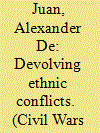

|
|
|
|
|
| Publication |
2013.
|
| Summary/Abstract |
Institutions can contribute to regulating interethnic conflict; however, in many cases, they fail to bring about lasting peace. The article argues that the negligence of subgroup identities accounts for some of this failure. Ethnic groups are often treated as unitary actors even though most consist of various linguistic, tribal, or religious subgroups. When interethnic conflict is settled, subgroup differences may come back to the fore. This 'resurgence' can lead to subgroup conflict about the political and economic resources provided through intergroup institutional settlements. This can in turn undermine the peace-making effect of intergroup arrangements. Different subgroup identity constellations make such destructive effects more or less likely. The article focuses on self-government provisions in the aftermath of violent interethnic conflict and argues that lasting intergroup arrangements are especially challenging when they involve 'contested' ethnic groups.
|
|
|
|
|
|
|
|
|
|
|
|
|
|
|
|
| 8 |
ID:
193587
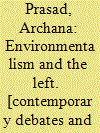

|
|
|
|
|
| Publication |
New Delhi, Left-Word Books, 2004.
|
| Description |
126p.pbk
|
| Standard Number |
8187496444
|
|
|
|
|
|
|
|
|
|
|
|
Copies: C:1/I:0,R:0,Q:0
Circulation
| Accession# | Call# | Current Location | Status | Policy | Location |
| 060494 | 333.7/PRA 060494 | Main | On Shelf | General | |
|
|
|
|
| 9 |
ID:
151470
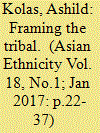

|
|
|
|
|
| Summary/Abstract |
This article examines the framing of ‘ethnic conflict’ in Northeast India, focusing on militant groups and insurgency in the hill areas of Assam and a form of political violence known locally as ‘ethnic clashes’. The article argues that ‘ethnic clashes’ have become an institutionalized form of armed violence in the region, while ‘ethnic rivalry’ is a key diagnostic frame for conflict. As enactments and imaginaries of institutionalized violence, ‘ethnic clashes’ are a product of actors who hold stakes in representing armed political violence as a result of ‘ethnic conflict’ between rivaling tribal communities. The article looks at the representation of causes of conflict as well as the framing of acts of violence as key sites of contestation, and thus as integral aspects of the conflict. This raises questions about the feasibility of scholarly efforts to make sense of specific cases of conflict via generic categories such as the ‘ethnic conflict’.
|
|
|
|
|
|
|
|
|
|
|
|
|
|
|
|
| 10 |
ID:
092672
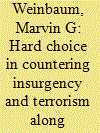

|
|
|
| 11 |
ID:
096924
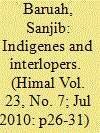

|
|
|
| 12 |
ID:
104216
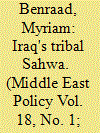

|
|
|
| 13 |
ID:
110343
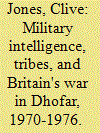

|
|
|
|
|
| Publication |
2011.
|
| Summary/Abstract |
This article examines the hitherto overlooked role of military intelligence in the Dhofar campaign of 1970-1976. Drawing on an array of new sources, it not only details the functional role of military intelligence in the campaign, but also makes a distinction between "attitudinal" and "behavioral" support in understanding the "human terrain," and thereby how military intelligence helped secure acceptance of the regime of Sultan Qaboos bin Sa'id among the tribes of Dhofar.
|
|
|
|
|
|
|
|
|
|
|
|
|
|
|
|
| 14 |
ID:
099468
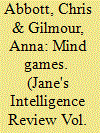

|
|
|
| 15 |
ID:
107097
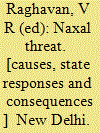

|
|
|
|
|
| Publication |
New Delhi, Vij Books, 2011.
|
| Description |
xi, 178p.
|
| Standard Number |
9789380177779, hbk
|
|
|
|
|
|
|
|
|
|
|
|
Copies: C:1/I:0,R:0,Q:0
Circulation
| Accession# | Call# | Current Location | Status | Policy | Location |
| 056201 | 322.42/RAG 056201 | Main | On Shelf | General | |
|
|
|
|
| 16 |
ID:
091684
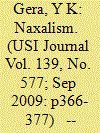

|
|
|
| 17 |
ID:
112761
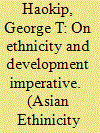

|
|
|
|
|
| Publication |
2012.
|
| Summary/Abstract |
'North East India' composed of different ethnicity is plagued with ethnic assertions and regionalism with that of centuries of alienation. Development is one big issue that need to be address in the region. The North East India after decades of independence is still lagging behind in term of socio, economic, education, political, cultural and social development. A deeper study reveals that movement for separate homeland, regionalism, tribalism, ethnic clash, crime, mass poverty, etc in the region are caused by backwardness of the region. The distinct geo-ethnic and socio-historical characters of North-East India constitute the hotbed of ethnic strife and extreme radicalism. The solution lies partly in resolving the conflict between primordial ethnic loyalties or 'ethno-nationalism' and the 'nationalism of the nation state', and partly a conscious and voluntary effort to resist corruption and unholy alliance between the militants and the politicians in the region. In any case, ethnic reconciliation would result in the reduction of ethnic violence of all kinds and would eventually restore law and order in the region. When the civil governance in the region will be spared from combating militancy or appeasing the militants, the whole energy of the government would be for strengthening the institutions of local self-government, which act as potential agents of development in the conflict-ridden states of the North-East India.
|
|
|
|
|
|
|
|
|
|
|
|
|
|
|
|
| 18 |
ID:
165134
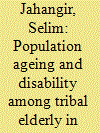

|
|
|
|
|
| Summary/Abstract |
The prevalence of disability in activities of daily livings is higher among Indian elderly as compared to other ageing countries in Asia. This study provides an overview of the prevalence of disability by gender and region (rural and urban) among the tribal elderly in West Bengal, India. Cross-tabulation method was employed to examine the pattern of tribal ageing disability in all 19 districts of West Bengal. Based on Census 2011 data, the study showed that prevalence of disability among tribal elderly was significantly higher than general elderly population. The study also validated the low socio-economic and vulnerable condition of the ethnic groups in different districts of the State. The governments should implement the public health policies to reduce the burden of disability by providing healthcare services, education and social and economic security particularly to the rural tribal elderly disabled people for their better quality of life.
|
|
|
|
|
|
|
|
|
|
|
|
|
|
|
|
| 19 |
ID:
096962
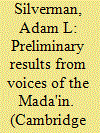

|
|
|
|
|
| Publication |
2010.
|
| Summary/Abstract |
From July to October 2008, Human Terrain Team Iraq 6 (HTT IZ6) undertook an oral tribal study and social history project in Mada'in Qada, Iraq. During that four-month period IZ6 formally interviewed over forty tribal leaders. At the same time team members participated in humanitarian assistance operations with internally displaced persons (IDPs), as well as regular citizens of the region. In both the formal, elite-level interviews and the participant observations, four major themes became apparent: (1) The tribal law, written or oral, is often generally perceived as codes, covenants, and/or constitutions. (2) The tribal legal system and the tribal courts are an adversarial and remedial/restorative justice mediation system. (3) The Government of Iraq (GOI) is perceived as being under foreign influence. Members of the GOI are commonly referred to as Iranian agents, Iranians, Zoroastrians and/or fire worshippers (Mithraites) by both Sunnis and Shi'a alike. And (4) the dispute between Sunni and Shi'a is predominantly about resources, not religion. The purpose of this article is to describe the task order for the project, describe the oral history project itself, discuss the research challenges that arose in a semi-permissive environment, present the preliminary findings and tie them into the reality of the ongoing Counterinsurgency Operations in Iraq.
|
|
|
|
|
|
|
|
|
|
|
|
|
|
|
|
| 20 |
ID:
131986


|
|
|
|
|
| Publication |
2014.
|
| Summary/Abstract |
A joint publication of the International Work Group for Indigenous Affairs (IWGIA) and Bindrai Institute for Research Study and Action (BIRSA), this treatment reads as a cross between a Zapatista manifesto and useful scholarship. It is worth quoting in full the cover blurb, because it illustrates well an approach which emerges in perhaps a majority of the works on Indian Maoism: 'The basic line of inquiry concerning the issues (dispossession from life supporting resources of land, forest, water and identity), the main cause (internal colonialism) and the remedy (provision of autonomy), has been discussed by leading social scientists and activists. In the process can be seen emerging a development critique with an alternative provided by the tribal/indegeous [sic] perspective aimed at reconstructing a society based on equality; economy based on cooperation, caring-sharing conservation, subsistence and decentralization; a policy based on conscience democracy [sic] and art based on collective participation and enjoyment.
|
|
|
|
|
|
|
|
|
|
|
|
|
|
|
|
|
|
|
|
|